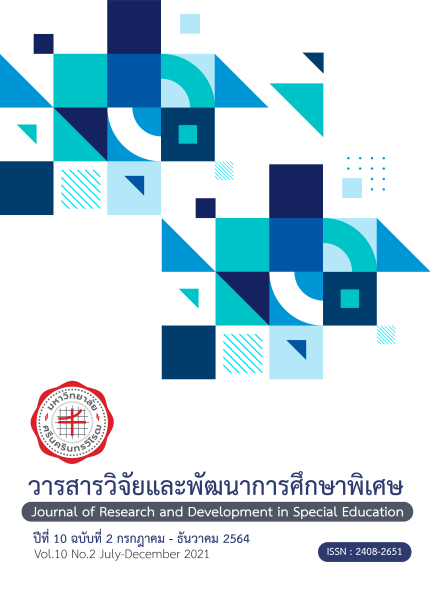การบูรณาการหลักวุฒิธรรมเพื่อส่งเสริมการมีส่วนร่วมของผู้ปกครองและครูในการจัดการศึกษาพิเศษเรียนร่วม
Abstract
บทคัดย่อ การวิจัยนี้ มีวัตถุประสงค์ เพื่อศึกษาสภาพปัจจุบัน ปัญหา และแนวทางการศึกษาและพัฒนากระบวนการส่งเสริมการมีส่วนร่วมของผู้ปกครองและครูในการจัดการศึกษาพิเศษเรียนร่วมตามหลักวุฒิธรรม โดย การวิจัยนี้เป็นการวิจัยเชิงคุณภาพรูปแบบกรณีศึกษา ผู้ให้ข้อมูลในการวิจัยนี้เป็นผู้บริหารสถานศึกษา ครูหลักสูตรการศึกษาทั่วไป ครูการศึกษาพิเศษ และผู้มีส่วนได้ส่วนเสียกับโรงเรียน รวม 18 คน โดยผ่านการคัดเลือกแบบเจาะจงตามคุณลักษณะที่ผู้วิจัยได้กำหนดไว้ เครื่องมือที่ใช้ในการวิจัยครั้งนี้ คือ ประเด็นคำถามเพื่อการสนทนากลุ่ม และวิเคราะห์ข้อมูลด้วยการวิเคราะห์เนื้อหา ผลการวิจัย พบว่า 1) ผู้บริหาร ครู และผู้มีส่วนได้ส่วนเสียกับโรงเรียนมีระดับความตระหนักและเห็นความสำคัญของการจัดการศึกษาพิเศษเรียนร่วมแตกต่างกัน เพื่อให้การส่งเสริมพัฒนาการและคุณลักษณะพึงประสงค์ของผู้เรียน จึงควรร่วมมือกันส่งเสริมพัฒนาให้นักเรียนที่มีความต้องการพิเศษ ได้รับการพัฒนาทักษะการเรียนรู้และทักษะสังคมให้สามารถช่วยเหลือตนเองได้เป็นสำคัญ 2) ผู้ปกครองและครูต้องได้รับการพัฒนาความรู้ ความเข้าใจ เจตคติที่ดี และการปฏิบัติต่อเด็กที่มีความต้องการพิเศษอย่างเหมาะสม ทักษะการดูแลช่วยเหลือเด็กที่มีความต้องการพิเศษ การส่งเสริมการศึกษาให้เต็มตามศักยภาพและทักษะสังคมให้เป็นไปในแนวทางเดียวกัน 3) หลักวุฒิธรรมควรนำมาบูรณาการเพื่อการส่งเสริมการมีส่วนร่วมของผู้ปกครองและครูในการจัดการศึกษาพิเศษเรียนร่วม 4) ครูและผู้ปกครองต้องมีส่วนร่วมในการวิเคราะห์ผู้เรียนเป็นรายบุคคล การจัดทำแผนการจัดการศึกษาเฉพาะบุคคล (IEP) แผนการสอนเฉพาะบุคคล (IIP) การผลิตและจัดหาสื่อ สิ่งอำนวยความสะดวก เพื่อใช้ในการจัดการเรียนรู้ และพัฒนาผู้เรียนอย่างเต็มตามศักยภาพ 5) ผู้ปกครอง ครูและผู้มีส่วนได้ส่วนเสียควรมีกิจกรรมร่วมกันอย่างต่อเนื่องตามหลักการมีส่วนร่วม โดย บูรณาการกับการสร้างชุมชนแห่งการเรียนรู้ทางวิชาชีพ (Professional Learning Community: PLC) ซึ่งเป็นศาสตร์สมัยใหม่จะทำให้การมีส่วนร่วมมีความเข้มแข็ง และจะส่งผลให้เด็กที่มีความต้องการพิเศษได้รับการพัฒนาอย่างมีประสิทธิภาพ คำสำคัญ: หลักวุฒิธรรม, การมีส่วนร่วม, การจัดการศึกษาพิเศษเรียนร่วม ABSTRACT The purpose of this study was to study states, problems, and approaches in education and develop a process to encourage parents and teachers participation in Special Needs Education Management based on the principle of the Vuddhidhammas. This research is a qualitative case study research technique. The sampling group including the 18 of the school administrators, general teachers, special education teachers, and school stakeholders and selected by purposive sampling. The instrument used in this research was group discussion questions. The data analysis used content analysis method. The research results showed that 1) the school administrators, general teachers, special education teachers, and school stakeholders, had aware and gave emphasis to Special Needs Education Management differently; to improve developmental management and training for students with special needs to receive training, learning, and social skills 2) Both parents and teachers acquire knowledge, understanding, a positive attitude, and appropriate treatment with the caring skill of children with special needs and promote their education of full potential along with social skills 3) the principle of the Vuddhidhammas should be integrated to encourage parents and teachers participation with special needs education management 4) Both parents and teachers should be involved in the process of individual learner analysis and developed Individualized Education Program (IEP), An individual implementation plan (IIP), produce and provide materials and tools for learning management and develop the learner fully potential 5) Parents, teachers and school stakeholders should be ongoing joint activities in accordance with the principle of participation by integrating with the construction of Professional Learning Community (PLC),which is a modern science that empowered participation and this will result in effective development of children with special needs. Keywords: The Principle of the Vuddhidhammas, Participation, Special education managementDownloads
Download data is not yet available.
Downloads
Published
2021-12-31
Issue
Section
Research article




